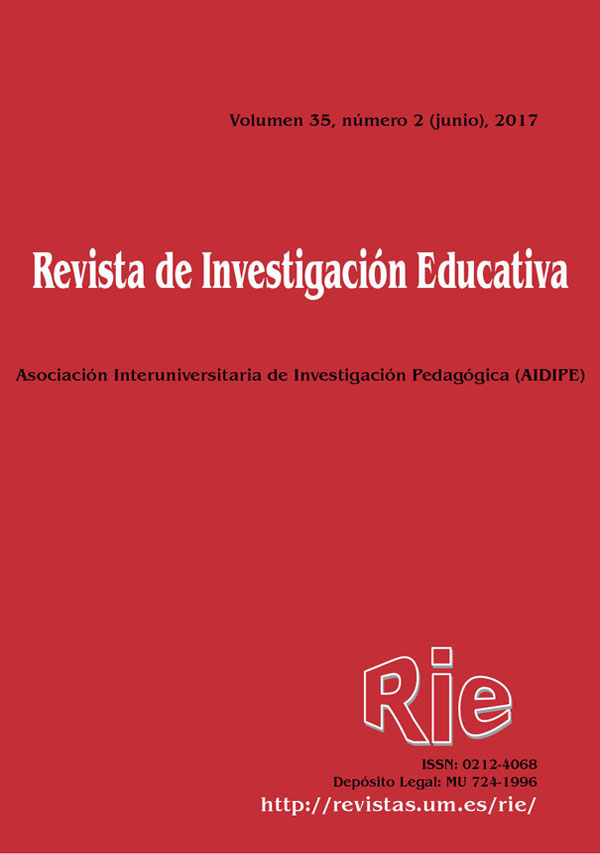Adults who build minors in school. Attitudes of parents and teachers in front of cultural diversity
Supporting Agencies
- Consejeria de Educación y Ciencia de la Junta de Andalucia
Abstract
Apart from the classroom teaching act itself, the attitudes of adults (parents and teachers) determine the attitudes of minors (children and students), specially when it occurs in cultural diversity circumstances. This is not surprising, given the proliferation of school attendance of students from different cultures in the current school centres. Therefore, this article examines this attitudinal dimension through a combined methodology that provides an affluence of data and statistical significance. Data collection has been done throughout interviews to 22 parents and 24 teachers, considering both as two separate case studies. Analysis of their statements is applied in order to describe the dominant attitudinal pattern. Percentage and inferential analysis have also been applied to quantify the degree of agreement and differences intra-case and inter-cases. Attitudinal gaps and differences between cases which could generate confusion and search for alternative attitudinal behaviours in other social areas are observed.
Downloads
-
Abstract1376
-
PDF (Español (España))825
-
Base de datos SPSS sobre ...825
-
Base de datos SPSS sobre ...825
-
Base de datos fundida. Pr...825
-
Resultados con Gráficos s...825
-
Resultados con Gráficos s...825
-
Resultados con Gráficos s...825
References
Aguado, T., Ballesteros, B., Malik, B., & Sánchez, M. (2003). Educación intercultural en la enseñanza obligatoria: prácticas escolares, actitudes y opiniones de padres, alumnos y profesores; resultados académicos de los estudiantes de diversos grupos culturales. Revista de Investigación Educativa, 21(2), 323-348. http://revistas.um.es/rie/article/viewFile/99241/94841
Calvo, T. (2008). Actitudes ante la Inmigración y cambio de valores, Madrid: UCM. Cameron, R. (2011). Mixed Methods Research: The five Ps framework. The Electronic Journal of Business Research Methods, 9(2), 96-108. http://www.ejbrm.com
Díaz, S. M. (2014). Los métodos mixtos de investigación: presupuestos generales y aporte a la evaluación educativa. RPP, 48(1), 7-23. http://dx.doi.org/10.14195/16478614_481_1
Etxebarria, F. , & Intxausti, N. (2013). La percepción de tutores sobre la implicación educativa de familias inmigrantes en la comunidad autónoma del País Vasco. REOP, 24(3), 43-62. http://dx.doi.org/10.5944/reop.vol.24.num.3.2013.11244
Etxebarria, F., Intxausti, N., & Joaristi, L. (2013). Factors Favouring the Educational Involvement of Immigrant Families with Children in Primary Education. Revista de Psicodidáctica, 18(19), 43-62. http://dx.doi.org/10.1387/RevPsicodidact.5684
Fernández, A.D. (2016). Estudio de casos sobre la diversidad cultural en centros de secundaria de Granada (Tesis Doctoral). Universidad de Granada, Granada.
Franzé, A. (2008). Diversidad cultural en la escuela. Algunas contribuciones antropo- lógicas. Revista de Educación, 345, 111-132. http://www.revistaeducacion.mec.es/re345_05.html
Garreta, J. (2008). Escuela, familia de origen inmigrante y participación. Revista de Educación, 345, 133-155. http://www.revistaeducacion.mec.es/re345_06.html
Gómez, I. (2015). Formación del profesorado para el tratamiento educativo de los conflictos sobre diversidad cultural y de género (Tesis doctoral). Universidad Com- plutense de Madrid. Madrid.
Intxausti, N., Etxeberria, F., & Joaristi, L. (2014). ¿Coinciden las expectativas escolares de la familia y del profesorado acerca del alumnado de origen inmigrante? RELIEVE, 20(1), 1-21. http://dx.doi.org/10.7203/relieve.20.1.3804.
Leiva, J. J. (2008). Interculturalidad, gestión de la convivencia y diversidad cultural en la escuela: Un estudio de actitudes del profesorado. RIEOEI, 46(2), 1-14. http://rieoei.org/2297.htm
Leiva, J. J. (2010). La formación del profesorado de educación primaria y secundaria en educación intercultural: un estudio cualitativo, Ciencias de la Educación, 223, 311-332.
Leiva, J. J. (2012). La formación en educación intercultural del profesorado y la comu- nidad educativa. REID, Monográfico-Octubre, 8-31. http://www.revistareid.net/monografico/n2/REIDM2art1.pdf
Leiva, J. J. (2013). Relaciones interpersonales en contextos de Educación Intercultural: un estudio cualitativo. Dedica. Revista de Educação e Humanidades, 4, 109-128. https://dialnet.unirioja.es/servlet/articulo?codigo=4252334
Leiva, J. J. , & Escarbajal, A. (2011). La participación de las familias inmigrantes como fundamento pedagógico en la construcción de la interculturalidad en la escuela, Educatio siglo XXI, 29(2), 389-416. https://dialnet.unirioja.es/servlet/articulo?codigo=3719934
Merino, D., & Leiva, J.J. (2007). El docente ante la realidad intercultural: análisis de sus actitudes para la comprensión de sus nuevas funciones. El Guiniguada, 16, 80-95.
Merino, D., & Ruiz, C. (2005). Actitudes de los profesores hacia la educación intercul- tural. Aula Abierta, 86, 185-203. https://dialnet.unirioja.es/servlet/articulo?codigo=2328717
Moliner, L., & Moliner, O. (2010). Percepciones del profesorado sobre la diversidad. REI, 3(3), 23-33. http://www.ujaen.es/revista/rei/linked/documentos/documentos/11-2.pdf
Salas, A., Prada, E., Palomar, V., Suárez, N., Zapico, R., Guatierri, J., & Diez, E. (coord.) (2012). La educación intercultural percepciones y actitudes del pro- fesorado. RIEOEI, 58(1), 1-15. http://rieoei.org/rie_contenedor.php?numero=4652&titulo=La%20educaci%C3%B3n%20intercultural:%20percepciones%20y%20actitudes%20del%20profesorado
Santana, L. E., Feliciano, L. & Jiménez, A. B. (2016). Apoyo familiar percibido y proyecto de vida del alumnado inmigrante de educación secundaria. Revista de Educación, 372, 35-62. http://dx.doi.org/10.4438/1988-592X-RE-2015-372-314.
Santos, M. A., & Lorenzo, M. M. (2009). La participación de las familias inmigrantes en la escuela. Un estudio centrado en la procedencia. Revista de Educación, 350, 277-300. http://www.revistaeducacion.mec.es/re350/re350_12.pdf
Santos, M. A., Lorenzo, M., & Priegue, D. (2011). Infancia de la inmigración y educación: la visión de las familias. RIE, 29(1), 97-110. http://revistas.um.es/rie/article/view/110351/126952
Torres, J. (2008). Diversidad cultural y contenidos escolares. Revista de Educación, 345, 83-110. http://www.revistaeducacion.mec.es/re345/re345_04.pdf
The articles and scientific documents published in RIE abide the following conditions:
1. The Servicio de Publicaciones de la Universidad de Murcia (the publisher) has the property rights (copyright) of all the documents published and allows the reuse under the user’s license indicated in point 2.
2. All documents are published in the digital edition of RIE under a Creative Commons Reconocimiento-NoComercial-SinObraDerivada 4.0 Internacional. (legal document) license. These documents can be copied, used, distributed, communicated and explained publicly if: i) the author(s) and its original source of publishing (magazine, publisher and URL of the document) are cited; ii) it is not used for commercial purpose; iii) the existence and the specifications about this license are mentioned.
3. Auto-archive’s conditions. The authors are allowed and encouraged to digitally distribute the pre-print versions (a version before evaluation) and/or post-print (a version that it is already evaluated and accepted to its publication). This promotes circulation and distribution earlier and can increase the citations and significance within the academic community.









